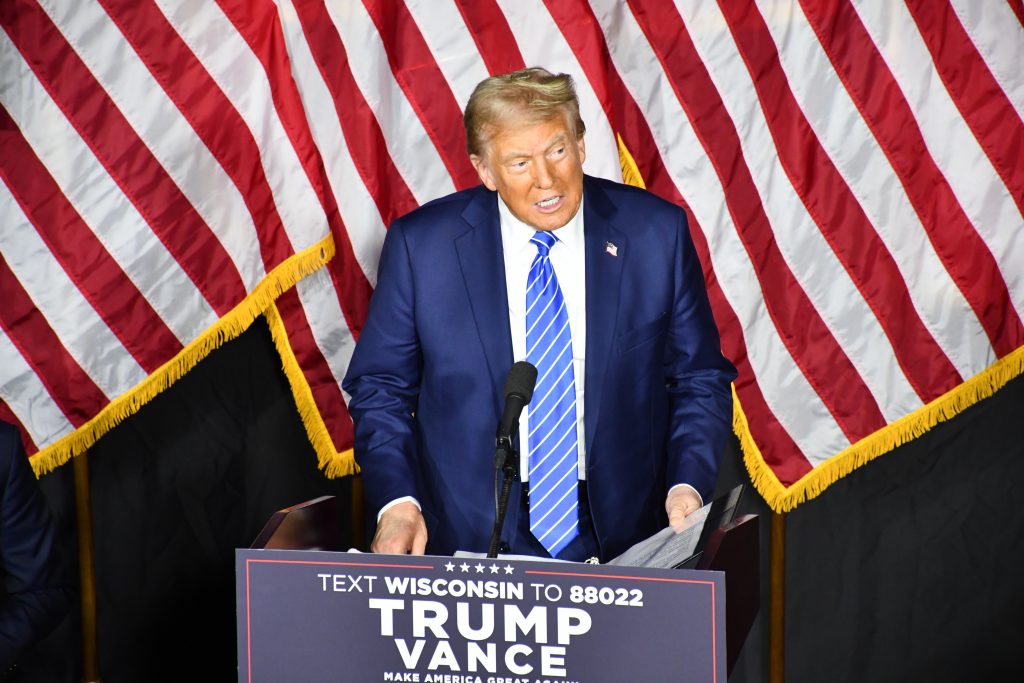Trump’s Plan To Change Census Could Reduce Wisconsin Funding
UW-Madison expert says president’s proposal appears at odds with Constitution.

Donald Trump speaks at Discovery World. Photo Taken Oct. 1, 2024 by Graham Kilmer.
President Donald Trump says he’s ordering a new census that will exclude undocumented immigrants for the first time in U.S. history, a move that could have tangible implications for Wisconsin and other states if it were allowed to stand by the courts.
A social media post by Trump early Thursday claimed he’s instructed the U.S. Department of Commerce to “immediately begin work” on a new census “using the results and information gained from the Presidential Election of 2024.” Trump also said people in the country illegally “WILL NOT BE COUNTED IN THE CENSUS.”
According to estimates from the Pew Research Center, there were around 70,000 undocumented immigrants living in Wisconsin as of 2022. The analysis shows California had around 1.8 million undocumented residents, Texas had around 1.6 million and Florida around 1.2 million.
University of Wisconsin-Madison Political Science Professor Barry Burden told WPR it’s unclear whether Trump is talking about excluding undocumented residents before the 2026 midterms or the 2030 census, which has already been in the planning stages for years.
“It seems impossible for a census of any kind to be done in time for the 2026 midterms,” Burden said.
What’s more, Burden said, is the U.S. Constitution has clear language when it comes to when the census is supposed to happen and who gets counted. Article I, Section 2 of the Constitution states that residents should be tallied every 10 years, as has been done since the first census in 1790. The 14th Amendment of the Constitution specifies that “the whole number of persons” in each state shall be counted.
Burden noted that during Trump’s first term in office, his administration attempted to include a citizenship question on census forms. A panel of three federal judges in Manhattan unanimously rejected the idea in 2020, stating that the “merits of the parties’ dispute are not particularly close or complicated.” The case was appealed to the U.S. Supreme Court, but justices dismissed it without ruling on the merits.
If Trump’s administration proceeds with trying to exclude undocumented residents of the U.S. from any census, Burden said it “would probably be tied up in court, maybe until the actual census happens in 2030 anyway.”
“Like so many things that Trump does, it’s possible this post doesn’t actually turn into any real policy actions from the administration,” Burden said. “It might be a way to change the subject from other things that are happening in current affairs that are not as favorable to him.”
Census data is used to determine US House, state legislative representation
Setting aside the political and legal questions, Burden said leaving millions of undocumented residents out of the census could have a range of impacts on Wisconsin. He said one effect might be the allocation of Wisconsin’s House seats.
“If the distribution of (congressional) districts was based only on citizens, some states in the south and the west would lose,” Burden said. “And so that might shift some districts back to the Midwest and the Northeast.”
Burden said it’s not clear that Wisconsin would gain U.S. House seats beyond the eight it has right now.
But Burden said there could be effects on Wisconsin’s 99 state Assembly and 33 state Senate districts if the Legislature were to draw districts using census data excluding people without legal status. In essence, he said parts of Wisconsin could lose legislative seats and others could see gains.
The bigger effects, Burden said, would be related to federal funding. He says many of the formulas to determine federal spending in states are based on census data, “and that includes minors and noncitizens and people who are here on visas and visiting and other kinds of things.”
“If some of those groups were to be excluded, maybe Wisconsin would be advantaged, because there’s some other states with larger numbers of noncitizens that would be affected more dramatically,” Burden said. “It remains to be seen exactly what this post from Trump turns into and whether his plans actually reach that far.”
Wisconsin’s congressional delegation largely silent, aside from Tom Tiffany
Most members of Wisconsin’s congressional delegation did not respond WPR when asked to comment on the president’s idea.
U.S. Rep. Tom Tiffany, R-Minocqua, a potential candidate for governor, was the exception. In a written statement, Tiffany said “states that harbor illegal aliens should not be rewarded with extra congressional seats or federal funding.”
“The Census was never intended to inflate representation for those who break our laws,” Tiffany said. “To protect the integrity of our elections, it must count only U.S. citizens because anything else dilutes the voice of American voters.”
Trump’s plan to exclude noncitizens from census could affect Wisconsin representation, federal funding was originally published by Wisconsin Public Radio.
If you think stories like this are important, become a member of Urban Milwaukee and help support real, independent journalism. Plus you get some cool added benefits.






















Tiffany’s district is mostly rural. Farmers in his district–as well as all of Wisconsin–depend on immigrant workers. So his statement in favor of a census that does not count immigrants hurts his constituents. Besides, the 14th amendment clearly states that all residents are too be counted.
To his insinuation that immigrant farm workers are breaking the law is ludicrous. With that said, his comments reflect the extreme xenophobia of the current administration. The US is a country of immigrants. The only “native” peoples are the Indigenous people. To close the US to immigration runs counter to the history of this country. Xenophobia never leads to greatness.